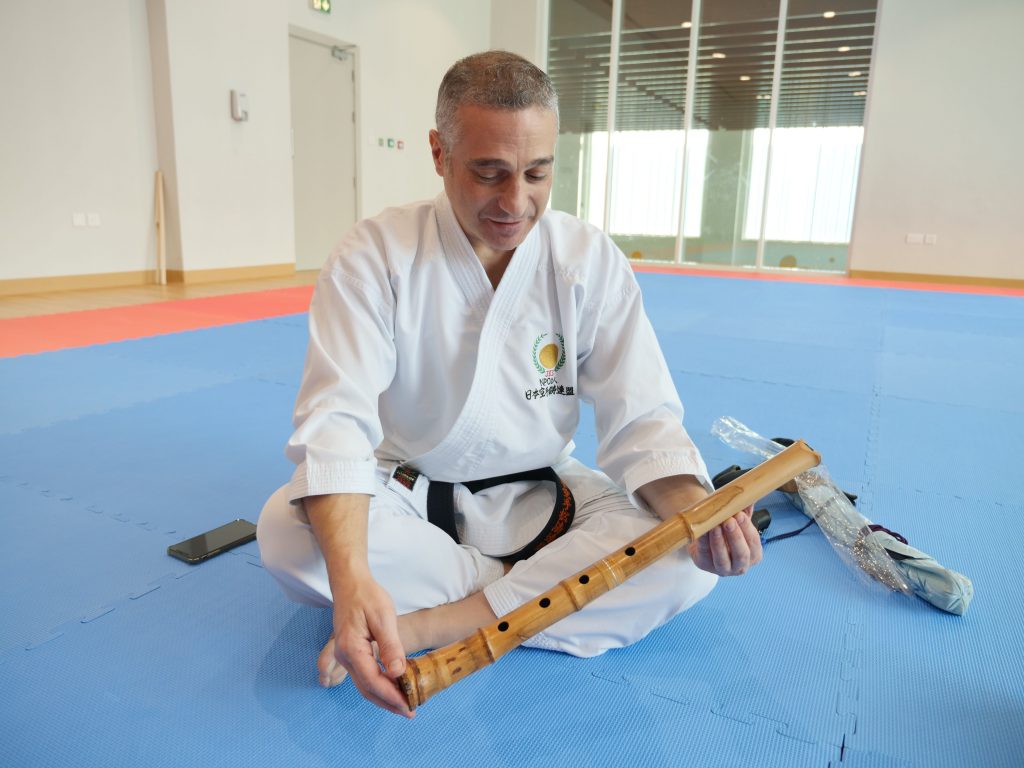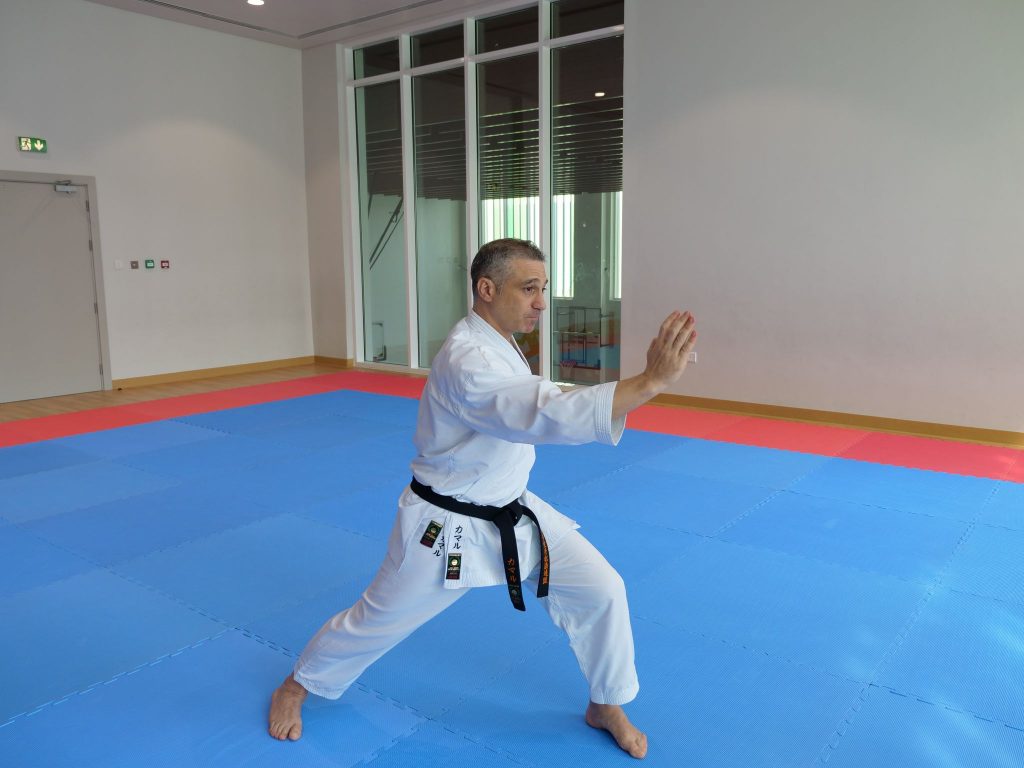



Kyle Kamal Helou, Founder of Shinkukan, and graduated Instructor and Middle East Director of JKS (Japan Karate Shoto Federation), holder of Shihan license in Shakuhachi (Japanese traditional music instrument) and Karate, and opened up his Karate Academy in Dubai last September.
Helou is a JKS 6th DAN Shotokan Karate-Do instructor and a graduate of the JKS HQ instructor training program, the only non-Japanese member of the board of instructors in Japan. In Shakuhachi, He is recipient of the Shihan (master instructor license) from the Chikumeisha Shakuhachi guild.
He resided in Japan for more than 10 consecutive years with ongoing training and teaching there for more than 20 years.
Helou shared exclusively to Arab News Japan inspiration for Japanese martial arts: “Growing up like many children in the late 1970’s, we had access to Arabic dubbed Japanese anime like, Adventures of Sinbad, Astro Ganger, Treasure Island and most importantly UFO Robot Grendizer where me and my brother used to watch them a lot and there were a lot of combat concepts in them. My interest in Karate started when I was about 10 years old where I was living in Beirut at the time and I would remember seeing my older brothers return from training in Shotokan Karate (where it got printed in my mind) and talking about their training in sheer fascination how their teacher instruct them during the training.”
Helou traveled to Japan in 2000 where he competed at the ‘All Japan National Championship’ for Japan Karate Shoto Federation, he said: “Usually, the ‘All Japan National Championship’ are reserved only for Japan nationals, it happened that the head of JKS invited the U.S. National team to participate in the championship and I was among the team who went there, I competed and placed in the top 16 in kata competition and it was such an amazing achievement for me and giving me the potential to live in Japan and train with the Karate team of Teikyo University at that time.”
“Training under Kagawa Sensei and JKS instructors at both the JKS Hombu Dojo and Teikyo University was the most superior training I had undergone. That is the dream of any Karate practitioner: To be under the tutelage of great instructors. My commitment to the JKS and the bonds with the organization grew stronger the more I trained there. There was no doubt for me that the JKS is my Karate way”.
“Kagawa Sensei was my main influence, although, JKS instructors each influenced me through their own special abilities, and here is how. Ishimine Sensei influenced me with his supple, quick, and flowing motion. Kanayama Sensei with his slow callisthenic training, and his ability to train beyond anything humanly possible. Yamaguchi Sensei influenced me with his explosive hip movement that drives his techniques piercing through his opponent. Inada Sensei with his superior and inexplicable kicking ability. Makita Sensei with his lightning-fast movement in Kata. Matsue Sensei in his accurate and superior knowledge of the JKS Kata and their in-depth application. Nagaki and Nehei Sensei, who started with me on the course, are World Class athletes with tremendous ability. Nagaki Sensei is a proof that Karate is a combination of both Kata and Kumite, and not just one or the other, having won the All-Japan National Championships twice in both events,” he added.
Helou is being considered as the first non-Japanese who graduated from The Japan Karate Shoto Federation instructor’s course, which took him 3 years to get through various tests and challenges to achieve it (where it takes between 2 – 5 years).
The Japan Karate Shoto Federation is a non-profitable organization owes its existence to three great founders: Funakoshi Gichin, Nakayama Masatoshi and Asai Tetsuhiko.
The former JKS Chief Instructor, Asai Tetsuhiko Sensei, inherited modern karate from Nakayama Masatoshi Sensei and gave it a new perspective. In 2000, Asai Sensei established Japan Karate Shoto Federation in order to further develop the Budo karate evolution. He created new unique katas, practiced only by JKS members. They were Junro kata series, from Shodan to Godan, 17 Koten kata. He also launched innovative and daring wheelchair karate practice for people with reduced mobility.
Master Asai enriched Karate-do by intensive rotation movements and whip-like actions of body limbs. His vision of Budo karate had been projected over Junro and Koten katas, which meant powerful techniques through total control over body motion. Being seriously ill, the 71 years old Master Asai was capable of demonstrating breathtaking speed and power. He claimed that, even senior people with weaken muscular strength were able to produce explosive motions whether it be a kick or a punch.
The main difference between the JKA (Japan Karate Academy) and JKS according to Helou is that JKS has recently adapted a new series of Kata that were developed and polished by Master Asai Tetsuhiko, which are not present in the JKA.
Upon the graduation from The Japan Karate Shoto Federation instructor’s course in Japan, Helou visited the UAE for the first time in 2008 and then came back to Lebanon in 2009 along with his family and started a Karate dojo to teach martial arts to the community over there till 2020 and returned back to Japan. He came back and resided in the UAE in September 2022 and he was very pleased and grateful by the warm welcoming from the people and safety in the country.
Helou shared exclusively to Arab News Japan his story and inspiration for Shakuhachi (Japanese traditional music instrument): “As human beings, we have unlimited potentials within ourselves and back to UFO Robot Grendizer anime series where you can hear the sound of flute in some episodes of the show and I was fascinated by that sound.”
“As I grow older in the mid 1980’s, I started playing synthesisers and I heard a familiar sound of the flute while shuffling through the sounds in the synthesiser and the name shown on the screen of it was ‘Shakuhachi’. So, I was looking about the Shakuhachi back there was no internet or YouTube back then and eventually I found a teacher with real Shakuhachi in the U.S. and I started learning Shakuhachi with him”.
“I continued my lessons when I moved to Japan and my first teacher there was Mr. Christopher Yohmei Blasdel, who teaches Shakuhachi at the Kinko Ryu School. He had lived in Japan for over 30 years at that time. I also studied with Mr. Kinya Sogawa who teaches Shakuhachi at the Watazumido school in addition to being a master shakuhachi craftsman. I eventually apprenticed for many years in Shakuhachi making. So I studied under two teachers and received the Shihan (master instructor license) in 2019 from the Chikumeisha Shakuhachi Guild of the Kinko Ryu School” he added.
Helou is still practicing and teaching shakuhachi through online classes on social media pages, which helped him a lot during the Covid -19 pandemic.
The shakuhachi is derived from the Chinese bamboo-flute. The bamboo-flute first came to Japan from China during the 7th century. This style of bamboo flute, also called kodai shakuhachi (ancient shakuhachi), was used for playing gagaku, but died out in the 10th century. Eight kodai shakuhachi remain in the Shōsō-in Treasure Repository. There are no records of musical scores related to the kodai shakuhachi, so details such as its playing method and scale are unknown.
Helou also told Arab News Japan the story of establishing Shinkukan (Lebanon Japan Friendship Association for Peace): “I have founded Shinkukan in 2013 along with 3 of my associates in Lebanon with the soul aim of promoting harmony, solidarity and peace in Lebanon by using a range of non-formal Japanese educational programs and providing an environment where students develop the awareness and application of our core values such as: Perseverance, Agility, Self-Control, Tolerance, Empathy and Respect.”
“Every year since 2013 we have invited a Japanese instructor from Japan for a week-long workshop in Shotokan Karate. We also conducted our annual dinner ‘Gala’ to raise funds as well as holding our annual national championships. In addition to that, we would conduct marathon runs and assist the underprivileged in learning Shotokan Karate for the promotion of peace. However, after the big explosion at the Beirut Port on August 4 2020, the efforts of Shinkukan completely converted to providing aid to those who were unable to afford tuition for training. Training in Karate was so important to the mental well-being of those who suffered from the explosion and I felt that no financial restriction should stand in the way of healing through Karate training and Shakuhachi practice.”
Regarding his upcoming projects, Helou said: “My main project right now is to get my Al-In-Sports-Karate-Academy well known within the Dubai communities. I came here to provide my services in teaching Shotokan Karate-Do as is it taught at the Headquarters of the JKS in Tokyo, Japan. I am a graduate of the JKS Instructor Training Program and currently a 6th DAN black belt. My core beliefs are in maintaining a high level of precision and accuracy in technique while having fun in the process of learning and building character.”
“The facility is located at LLFPM school in Meydan and has a 150 Square Meters space fully equipped for learning Shotokan Karate-Do. The idea of the karate academy came from one of my students who recommended me to open a Dojo in Dubai with the aim of getting as many students who are able to learn from instructors including myself at the most available times. We want to be at a level where we can bring more instructors from JKS Headquarters on a regular basis to help elevate the level of our Karate practice and develop a team to compete at JKS local, regional and international events”.
“The JKS has been in existence here in the UAE for the past 15 years. I’m the JKS Middle East director and I oversee the teaching of over 30 branch dojos throughout the Middle East. I hope that my in-person teaching activities at these Dojo will return to normal as we phase out of the Covid-19 era and step into the era of healing and rejuvenation.” he added.